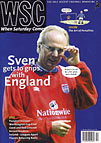 Hull City are likely to be saved from extinction… again. But this is an all to common experience for the club, writes Craig Ellyard
Hull City are likely to be saved from extinction… again. But this is an all to common experience for the club, writes Craig Ellyard
There is little doubt that by the time you read this article Hull City will, once again, have been saved. A “mystery consortium” have asked the club’s creditors to accept 30p in the pound on their outstanding liabilities. If, as expected, agreement is reached, the consortium, having already lodged a substantial bond, will take over the running of the club. So, all’s well that ends well?
Not quite. With the likelihood that the football club and ground will be sold to different parties the potential for further problems is huge. Once again, Hull City could be at the mercy of a landlord who sees Boothferry Park as a building site rather than a sports arena.
The proposed council-funded super stadium (see WSC 165) has now become essential to the club’s future. But with a single brick yet to be laid, the Tigers could be forced to groundshare in the interim with their rugby club neighbours. It’s a prospect which fills most Hull City supporters with dread and similar proposals have been bitterly opposed in the past. But with the club lurching from crisis to crisis the new owners may have no alternative.
Once again, the problems of the past are coming back to haunt the club. The financial troubles at Hull can be likened to a long running West End farce; the actors come and go, but the same ludicrous plot remains. Hull’s much touted potential has long been a magnet for businessmen with their eyes on the main chance but who develop collective amnesia when it comes to paying the debts.
Unsurprisingly, winding-up orders have been common, and the club was again hauled up before a judge in February. With City floundering under a welter of unpaid bills and deploying a squad of players they did not have the means to pay, the court appointed administrators to sell the club. When they hastily hung out the “open to all offers” signs the response was immediate.
Although interested parties were given only two weeks to put together a bid, there was no shortage of takers. Among the usual speculators and “Monopoly millionaires” the most exciting initiative was that of the fans group the Tigers Co-operative.
With such a limited time frame the Co-op, set up to “buy an effective stake in the club”, could not realistically expect to complete a buy-out, but they have achieved far more than was thought possible. Utilising huge publicity and encouraged by the success of a similar co-operative at Lincoln, the Hull group has established a sound financial base. Over 1,500 supporters have bought a shareholding with the capital raised, increasing the Co-op’s influence by the pound. Courted as potential partners by a number of consortia involved in the bidding for the club, including the new owners, the fans organisation has emerged as a serious player in Hull City’s future.
The players, too, were doing their bit. Unpaid since the turn of the year, the team somehow developed a steely determination which resulted in the club’s best run of wins in 15 years. Brian Little scooping the Manager of the Month prize was just reward for his and the team’s efforts. As the players performed heroics on the pitch, the co-operative was rattling collecting tins on the terraces. Over the course of two weeks the fans chipped in over £12,000 to pay the squad’s wages as a genuine “we’re all in this together” bond developed between players and supporters.
With new owners all but in place and the tantalising prospect of reaching the play-offs looking increasingly realistic, the Tigers Co-operative is redoubling its efforts to ensure a stable future for the club. As chair Rachel Mathieson explains: “We want to expand and raise our profile as much as possible and work with the new owners of the club if that is appropriate. The ultimate aim of the co-op remains to acquire an effective stake in Hull City. In an ideal world that would be a majority shareholding, but a first step could be a seat on the board and building up an effective relationship from within.”
It’s a bold and, given Hull’s financial history, possibly foolhardy move, but the Lincoln experience shows the ideal of community football clubs administered by supporters can be achieved. Why not in Hull?
From WSC 170 April 2001. What was happening this month